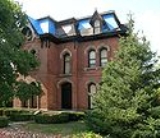
Elisha Taylor House
Encyclopedia
The Elisha Taylor House is a private home located at 59 Alfred Street in Detroit, Michigan
. The house was designated a Michigan State Historic Site in 1973 and listed on the National Register of Historic Places
in 1975. Since 1981, it has served as a center for art and architectural study, known as the Art House.
with large protruding dormers and unusual vergeboarding at the peak. It is one of the best examples surviving in Detroit of post-Civil War residential design.
Michigan
Michigan is a U.S. state located in the Great Lakes Region of the United States of America. The name Michigan is the French form of the Ojibwa word mishigamaa, meaning "large water" or "large lake"....
. The house was designated a Michigan State Historic Site in 1973 and listed on the National Register of Historic Places
National Register of Historic Places
The National Register of Historic Places is the United States government's official list of districts, sites, buildings, structures, and objects deemed worthy of preservation...
in 1975. Since 1981, it has served as a center for art and architectural study, known as the Art House.
History
The Elisha Taylor House was built for William H. Craig, a Detroit land speculator. In 1875, Craig sold the house to attorney Elisha Taylor. Taylor was a Detroit attorney who held many offices during his career, including City Attorney, assistant Michigan Attorney General from 1837 to 1841, and Circuit Court Commissioner from 1846 to 1854.Description
The Elisha Taylor House is two-and-a-half stories tall, made of red brick on a rough stone foundation. The structure is an eclectic mix of Gothic and Tudor Revival with elements of other styles, including Queen Anne and Italianate. The house has a high mansard roofMansard roof
A mansard or mansard roof is a four-sided gambrel-style hip roof characterized by two slopes on each of its sides with the lower slope at a steeper angle than the upper that is punctured by dormer windows. The roof creates an additional floor of habitable space, such as a garret...
with large protruding dormers and unusual vergeboarding at the peak. It is one of the best examples surviving in Detroit of post-Civil War residential design.

